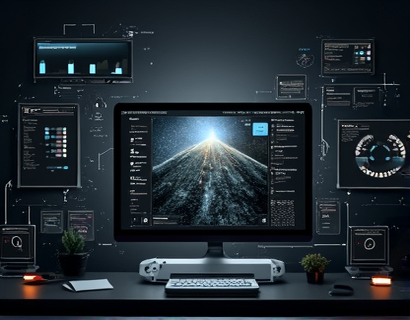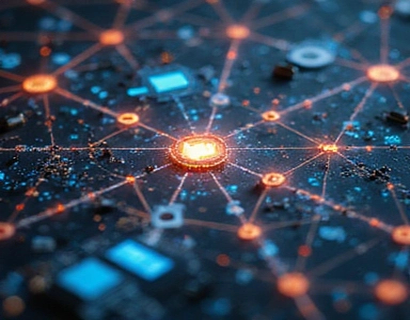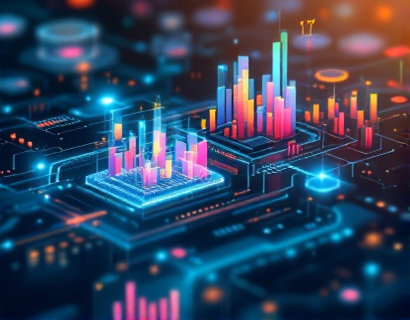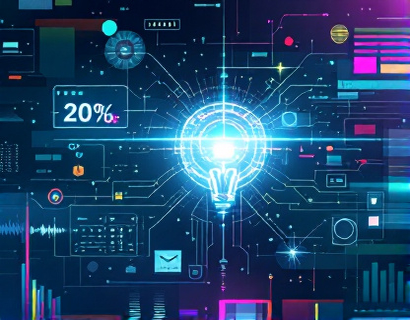Unlocking Advanced Digital Transformation: The Synergy of Crypto and AI
The intersection of cryptocurrency and artificial intelligence (AI) is catalyzing a new era of digital transformation, offering unprecedented opportunities for tech pioneers and early adopters. This convergence is not just a technological curiosity but a powerful force reshaping industries and redefining how we interact with digital solutions. As we explore this dynamic space, it's essential to understand the innovations that are driving this transformation and how they can be harnessed to revolutionize digital strategies.
Understanding Cryptocurrency and AI
Cryptocurrency, at its core, is a digital or virtual currency that uses cryptography for security and operates on a decentralized network, typically a blockchain. This decentralized nature ensures transparency, security, and reduces the need for intermediaries. On the other hand, AI refers to the simulation of human intelligence processes by machines, particularly computer systems. These processes include learning (the acquisition of information and rules for using it), reasoning (using rules to reach approximate or definite conclusions), and self-correction.
The integration of AI into cryptocurrency systems has led to the development of smart contracts, decentralized finance (DeFi) platforms, and advanced trading algorithms. Smart contracts, self-executing contracts with the terms directly written into code, leverage AI to automate and enforce contractual obligations without human intervention. DeFi platforms use AI to offer traditional financial services like lending, borrowing, and trading in a decentralized manner, enhancing accessibility and efficiency. AI-driven trading algorithms analyze vast amounts of data to predict market trends and execute trades with high precision and speed.
Innovations in Cryptocurrency and AI
One of the most significant innovations at the intersection of cryptocurrency and AI is the development of AI-powered cryptocurrency exchanges. These platforms use machine learning algorithms to optimize trading strategies, manage risk, and enhance user experience. For instance, AI can analyze historical data and real-time market conditions to identify profitable trading opportunities, adjust positions dynamically, and minimize losses. This level of automation and intelligence is transforming the way traders interact with cryptocurrency markets.
Another groundbreaking innovation is the use of AI in cryptocurrency security. Blockchain, while inherently secure, is not immune to all types of attacks. AI can detect and mitigate threats such as 51% attacks, smart contract vulnerabilities, and phishing attempts by analyzing patterns and anomalies in network activity. Machine learning models can be trained to recognize suspicious behavior and automatically trigger security protocols to protect user assets.
AI-Enhanced Cryptocurrency Wallets
Cryptocurrency wallets are evolving to incorporate AI to provide users with a more secure and user-friendly experience. AI-enhanced wallets can offer real-time alerts for unusual activity, predict potential security breaches, and suggest optimal wallet management strategies. For example, AI can analyze transaction patterns to identify when a user is most likely to make a purchase or transfer funds, and suggest the best times to execute these actions based on market conditions.
Furthermore, AI can simplify the process of managing multiple cryptocurrencies by automatically converting between different tokens, optimizing storage, and providing insights into portfolio performance. This level of automation not only enhances convenience but also reduces the risk of human error, making cryptocurrency management more accessible to a broader audience.
Decentralized Applications and AI
Decentralized applications (dApps) are another area where AI is making a significant impact. dApps leverage blockchain technology to create applications that are transparent, secure, and resistant to censorship. By integrating AI, these applications can offer advanced functionalities such as personalized user experiences, intelligent recommendation systems, and automated decision-making processes. For instance, a decentralized social media platform can use AI to curate content based on user preferences, filter out misinformation, and manage community moderation in a transparent and fair manner.
The combination of AI and dApps also opens up new possibilities in the realm of decentralized gaming. AI-driven non-playable characters (NPCs) can provide more realistic and engaging gameplay, while AI-powered matchmaking systems can ensure balanced and enjoyable gaming experiences. Additionally, AI can be used to create dynamic and adaptive game environments that evolve based on player behavior and preferences.
AI in Cryptocurrency Research and Analysis
For tech innovators and early adopters, AI is a powerful tool for cryptocurrency research and analysis. AI-driven analytics platforms can process and interpret vast amounts of data from various sources, including social media, news articles, and market reports. These platforms can identify trends, sentiment analysis, and potential market movements, providing valuable insights for investment decisions. By automating data collection and analysis, AI enables researchers and traders to stay ahead of the curve and make more informed decisions.
Moreover, AI can assist in the development of new cryptocurrencies and blockchain projects. By analyzing market needs, technological trends, and regulatory environments, AI can help identify gaps and opportunities for innovation. This data-driven approach can guide project developers in creating solutions that are not only technically sound but also aligned with market demands and regulatory requirements.
Challenges and Considerations
While the convergence of cryptocurrency and AI presents numerous opportunities, it also comes with challenges and considerations. One of the primary concerns is the regulatory landscape. As governments around the world grapple with how to regulate cryptocurrencies and AI, compliance becomes a critical factor for any innovation in this space. Tech pioneers and early adopters must stay informed about regulatory developments and ensure that their applications and services adhere to local and international laws.
Another challenge is the technical complexity involved in integrating AI with cryptocurrency systems. Developing robust and secure AI models requires expertise in both blockchain technology and machine learning. Collaboration between experts in these fields is essential to overcome these technical hurdles and create innovative solutions that are both effective and reliable.
Future Prospects
The future of cryptocurrency and AI is bright, with numerous potential developments on the horizon. One exciting area is the integration of AI with quantum computing, which could revolutionize the way we process and secure blockchain transactions. Quantum computing's ability to perform complex calculations at unprecedented speeds could enhance the efficiency and scalability of blockchain networks, making them more suitable for widespread adoption.
Additionally, the rise of central bank digital currencies (CBDCs) and their potential integration with AI could reshape the financial landscape. AI can help central banks design and implement CBDCs that are secure, efficient, and user-friendly, while also addressing concerns related to privacy and financial inclusion. This could lead to a more inclusive and resilient global financial system.
For tech innovators and early adopters, the convergence of cryptocurrency and AI offers a wealth of opportunities to drive digital transformation. By embracing these technologies and staying at the forefront of innovation, they can position themselves as leaders in the next wave of technological advancements. The key is to continue exploring, experimenting, and collaborating to unlock the full potential of this powerful synergy.










































